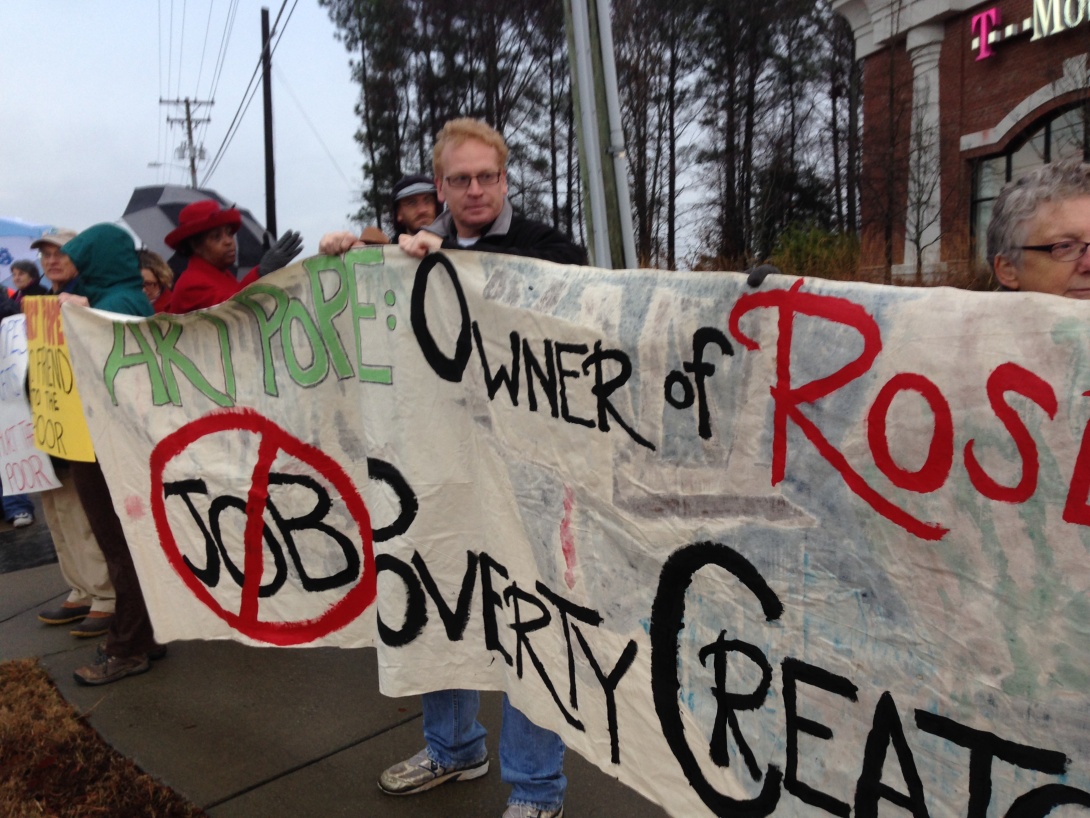Pickets at Art Pope's stores gain steam, go statewide

In North Carolina, Art Pope's rise as a conservative political kingmaker -- including his appointment this year as Republican Gov. Pat McCrory's budget director -- was fueled in large part with money from his business Variety Wholesalers, a retail chain and the owner of Maxway, Roses and other dollar-type stores.
These stores are the source of Pope's famly fortune, which he has used to generously support Republican candidates and conservative causes. This wealth launched the John William Pope Foundation in 1986, which has given tens of millions of dollars to outfits that have promoted key pieces of the GOP agenda, like North Carolina's sweeping new restrictions on voting access. And Variety Wholesalers itself has directly bankrolled groups that have spent millions in North Carolina to benefit Republican candidates.
But at the heart of Variety's business plan is a glaring contradiction: By the company's own admission, Maxway, Roses and other Variety stores target African-American and low-income communities -- consumers who may question the political agenda Pope uses their shopping dollars to promote.
To highlight the disconnect between the source of Pope's wealth and his agenda, last week the N.C. NAACP launched a statewide "informational picket" campaign at Maxway, Roses and other Variety stores.
So far, organizers say about 130 supporters have come out to picket in Chapel Hill, Durham and Raleigh, reaching hundreds of holiday shoppers. More pickets are planned this week in Charlotte, Fayetteville, Winston-Salem and Weaverville.
The pickets have generated media attention across North Carolina, as well as national coverage in outlets like MSNBC's "Rachel Maddow Show." As Rev. Dr. William Barber, president of the NC NAACP, told Maddow:
What we see with Art Pope is the most lewd and cynical and sinister form of wealth and power manipulation. To put your stores deliberately and publicly in communities of low wealth and 25 percent African-American, make your wealth off of people, pay them low wages, and then in turn use that power to push and promote policies that are adverse to their lives and diametrically opposed to their future, is just untenable.
As Rev. Barber and others observed in the press conference kicking off the Variety campaign, the pickets are a continuation of -- and have drawn much of their energy from -- the Moral Monday movement led by Barber in North Carolina this year, which brought thousands of people to the state capitol in Raleigh throughout the summer.
Unsurprisingly, Pope -- who appeared at the end of the picket kick-off press conference on Dec. 2 to briefly exchange words with Barber -- has condemned the pickets. In a public letter addressed to Barber [pdf], Pope said he was "shocked" and "saddened" by the picket campaign, claiming:
I am shocked that you and your allies would demand any public official to support your political positions, by threatening a business which is not part of state government.
But the blurring of lines between Pope's role as political donor and government official is a controversy that began when Pope joined McCrory's cabinet in January. As budget director, Pope often found himself negotiating with legislators who he helped elect, and who were being lobbied by Pope-backed organizations. The conflict of these interests was revealed in June, when Pope appeared on the floor of the General Assembly to discuss killing a key campaign finance reform measure with a House member who had received Pope backing, and which had been targeted by Pope-backed groups.
Picket organizers say they're getting requests from towns across the state to hold events at Maxway and Roses stores in the coming weeks. And if the picket at a Roses store in Durham on Monday is any indication, the information about Pope's political involvement is indeed news to shoppers at his stores. As the Durham Herald-Sun reported:
Durham resident Alex Johnson was headed to the Roses store on Monday. He said he saw the protestors near the road, but he didn’t know about the company’s connection to state politics through Pope. He also said he believe[s] store employees should get paid more.
Tags
Chris Kromm
Chris Kromm is executive director of the Institute for Southern Studies and publisher of the Institute's online magazine, Facing South.
